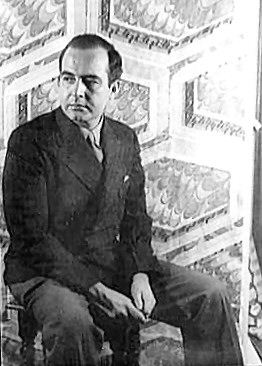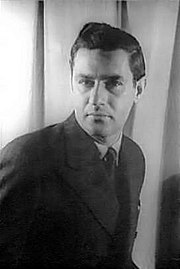
Vanessa is an American opera in three acts by Samuel Barber, opus 32, with an original English libretto by Gian Carlo Menotti. It was composed in 1956–1957 and was first performed at the Metropolitan Opera in New York City on January 15, 1958 under the baton of Dimitri Mitropoulos in a production designed by Cecil Beaton and directed by Menotti. Barber revised the opera in 1964, reducing the four acts to the three-act version most commonly performed today.

The Old Maid and the Thief is a radio opera in one act by Italian-American composer Gian Carlo Menotti. The work uses an English language libretto by the composer which tells a twisted tale of morals and evil womanly power. Menotti writes in the libretto "The devil couldn't do what a woman can – Make a thief out of an honest man."

Amahl and the Night Visitors is an opera in one act by Gian Carlo Menotti with an original English libretto by the composer. It was commissioned by NBC and first performed by the NBC Opera Theatre on December 24, 1951, in New York City at NBC Studio 8H in Rockefeller Center, where it was broadcast live on television from that venue as the debut production of the Hallmark Hall of Fame. It was the first opera specifically composed for television in the United States.

The Consul is an opera in three acts with music and libretto by Gian Carlo Menotti, his first full-length opera.
Lee Henry Hoiby was an American composer and classical pianist. Best known as a composer of operas and songs, he was a disciple of composer Gian Carlo Menotti. Like Menotti, his works championed lyricism at a time when such compositions were deemed old fashioned. His most well known work is his setting of Tennessee Williams's Summer and Smoke, which premiered at the St Paul Opera in 1971.
Francis "Chip" Menotti is an actor and former figure skater who was the president and artistic director of Festival dei Due Mondi.
Richard Mohr was one of RCA Victor’s most prominent producers of classical and operatic music recordings from 1943 through 1977. His producing credits included recording the casts of the world premieres of Samuel Barber's Vanessa and Gian Carlo Menotti's Amahl and the Night Visitors, as well as the first LP recordings of Ernani,Luisa Miller and Lucrezia Borgia and three versions each of Rigoletto,Aida,La Traviata and Il Trovatore.

Norman Kelley was an American operatic tenor who had an active international career during the 1940s through the 1970s. He was notably a regular performer at the Metropolitan Opera between 1957 and 1961, and he sang in several world premieres with the New York City Opera. He also notably translated Engelbert Humperdinck's Hänsel und Gretel into English, a version first performed in 1967 and used by opera companies to this present day.

The Island God is a one-act opera by Gian Carlo Menotti with a libretto by the composer. It was first performed on February 20, 1942, at the Metropolitan Opera in New York City.

The Last Savage is an opera in three acts by composer Gian Carlo Menotti. Menotti wrote his own libretto, originally in the Italian language. The opera was translated into French by Jean-Pierre Marty for the work's first (private) performance at the Opéra-Comique in Paris on 21 October 1963, followed the next day by the public premiere. George Mead translated the work into English for the opera's American premiere at the Metropolitan Opera the following year.

The Hero is a two-act opera by Italian-American composer Gian Carlo Menotti commissioned by the Opera Company of Philadelphia, to celebrate the United States Bicentennial. The work premiered at the Philadelphia Academy of Music on June 1, 1976. At this point of his career, Menotti's style of composition, which rejected the avant-garde, was out of favor with the classical music world. Time stated in its review of the opera, "Most of Menotti's music is passable Puccini: melodic, easy to take—and totally beside the point in 1976."

The Unicorn, the Gorgon and the Manticore or The Three Sundays of a Poet is a "madrigal fable" for chorus, ten dancers and nine instruments with music and original libretto by Gian Carlo Menotti. Based on the 16th-century Italian madrigal comedy genre, it consists of a prologue and 12 madrigals which tell a continuous story, interspersed with six instrumental interludes. The unicorn, gorgon, and manticore in the title are allegories for three stages in the life of the story's protagonist, a strange poet who keeps the mythical creatures as pets. The work premiered in Washington D.C. at the Library of Congress Coolidge Auditorium on October 19, 1956.

Martin's Lie is a chamber opera in one act with music and an English language libretto by Gian Carlo Menotti. Commissioned by CBS, it was Menotti's third opera for television after Amahl and the Night Visitors and Labyrinth. Although not initially conceived as a work for the stage, the opera premiered in a live theatrical performance on 3 June 1964 at the Bristol Cathedral for the opening of the 17th annual Bath International Music Festival. The opera was subsequently filmed with the same cast for television under the direction of Kirk Browning with Julie Andrews serving as host. The production used sets and costumes by designer Anthony Powell, and was broadcast nationally by CBS for the opera's United States television premiere on 30 May 1965.
Eugene B. Holmes was an American operatic baritone who sang with the New York City Opera, the Metropolitan Opera National Company and the Deutsche Oper am Rhein.

Gian Carlo Menotti was an Italian-American composer, librettist, director, and playwright who is primarily known for his output of 25 operas. Although he often referred to himself as an American composer, he kept his Italian citizenship. One of the most frequently performed opera composers of the 20th century, his most successful works were written in the 1940s and 1950s. Highly influenced by Giacomo Puccini and Modest Mussorgsky, Menotti further developed the verismo tradition of opera in the post-World War II era. Rejecting atonality and the aesthetic of the Second Viennese School, Menotti's music is characterized by expressive lyricism which carefully sets language to natural rhythms in ways that highlight textual meaning and underscore dramatic intent.
Andrea Velis was an American operatic tenor who had a lengthy association with the Metropolitan Opera that spanned 33 seasons. Considered a highly skilled character actor, he excelled in supporting roles, often to great comedic effect. His voice is preserved on several recordings made for Live from the Metropolitan Opera and the Metropolitan Opera radio broadcasts.

Joaquin Fidel Romaguera was an American tenor and actor. A longtime performer with the New York City Opera from the 1960s through the 1980s, he notably created the role of Professor Risselberg in the world premiere of Gian Carlo Menotti's The Most Important Man in 1971. On Broadway he originated the role of Adolfo Pirelli in the original Broadway production of Stephen Sondheim's Sweeney Todd: The Demon Barber of Fleet Street (1979). He was nominated for the Drama Desk Award for Outstanding Featured Actor in a Musical for his portrayal of Teddy in the 1987 off-Broadway revival of Cole Porter's Gay Divorce. Other career milestones included portraying Nicolas Orsini in the world premiere of Alberto Ginastera's Bomarzo with the Opera Society of Washington, and appearing as Captain Pirzel in the United States premiere of Bernd Alois Zimmermann's Die Soldaten with conductor Sarah Caldwell and the Opera Company of Boston in 1982.
Joanna Mary Bruno, also known as Joanna Bruno-Clarke, is an American operatic soprano who had an active international career during the 1960s and 1970s. A lyric soprano, she often performed in operas by Giacomo Puccini and Wolfgang Amadeus Mozart.
Don Yule was an American operatic bass who performed regularly with the New York City Opera (NYCO) for fifty years. A graduate of the Jacobs School of Music at Indiana University, he joined the NYCO in 1960 where he made his debut as Gluttony in a revival of Hugo Weisgall’s Six Characters in Search of an Author. He went on to perform in a total of 83 roles with the NYCO in more than 1,700 performances, most often in comprimario parts. Some of the roles he was associated with included Alcindoro and Benoit in Giacomo Puccini's La Bohème, Antonio and Bartolo in Mozart's The Marriage of Figaro, Dr. Grenvil in Giuseppe Verdi's La Traviata, and the Jailer and the Sacristan in Puccini's Tosca.
Thomas Jamerson is an American baritone who had an active international career as an opera and concert performer from the 1960s through the 1990s. He first drew distinction in the field of opera in 1968 when he recorded the role of Baron Douphol in Giuseppe Verdi's La traviata for RCA with conductor Georges Prêtre, the RCA Italiana Orchestra, and Montserrat Caballé as Violetta and Carlo Bergonzi as Alfredo. In 1969 he portrayed roles in the United States premieres of two operas at the Santa Fe Opera: Der Auserwählte in Arnold Schoenberg's Die Jakobsleiter and Captain of the Royal Guard in Hans Werner Henze's The Bassarids. He was a principal artist with the New York City Opera from 1969 to 1984. In 1971 he notably created the role of Professor Bolental in the world premiere of Gian Carlo Menotti's The Most Important Man. He currently teaches voice on the faculty at the Music Conservatory of Westchester in White Plains, New York.





